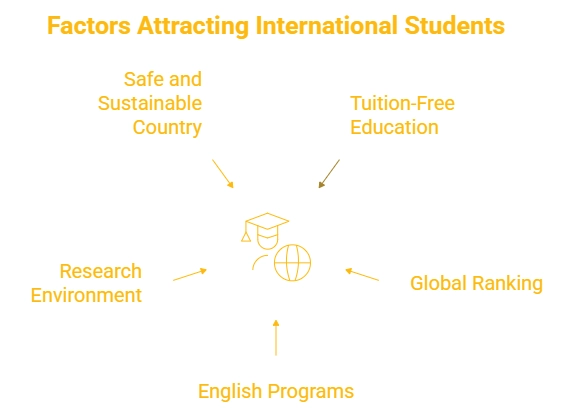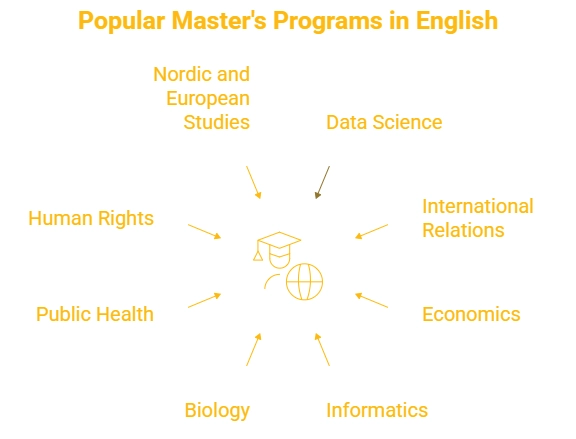The oldest and most prominent university in Norway is the University of Oslo (UiO), which is well-known for its cutting-edge research, excellent academic standards, and tuition-free education for students from abroad. Situated in the center of Oslo, Norway's capital, UiO provides a lively and welcoming atmosphere that is perfect for students from other countries.
The University of Oslo stands out as an affordable yet top-notch choice for UK students wishing to study in Europe. UiO offers a distinctive fusion of academic brilliance and cultural diversity with its top-tier faculty, English-taught master's programs in a variety of fields, and access to Norway's excellent standard of living.
*Need assistance to study in Norway? Y-Axis is here to assist you in all the ways.

Looking to study in a research-intensive, globally ranked public university in one of Europe’s most liveable capitals? The University of Oslo (UiO) offers 40+ English-taught master’s programs, world-class research opportunities, and a vibrant international student community in Oslo.
The University of Oslo (UiO) consistently ranks among the world’s top universities and is recognized as Norway’s leading higher education institution. Its strong placement across international ranking systems highlights its excellence in research, teaching, and global collaboration.
| Ranking System | 2025/2026 Position | National Standing |
| Times Higher Education (THE) 2025 | =116 globally | #1 in Norway |
| QS World University Rankings 2026 | 119 globally | #1 in Norway |
| ARWU / Shanghai 2025 | 83 globally | #1 in Norway |
| CWUR 2025 | 87 globally | #1 in Norway |
Subject Strengths: UiO is especially strong in Medicine, Physical and Earth Sciences, Law, Social Sciences, and Education, attracting international recognition and students worldwide.
The University of Oslo (UiO) offers a wide range of study opportunities for both domestic and international students. While most bachelor’s programs are taught in Norwegian, international applicants typically pursue the English-taught master’s programs, which span across disciplines in science, technology, humanities, law, social sciences, education, and health.
Key Highlights

Fields of Study

Courses are generally 2 years long (120 ECTS) and encourage research, interdisciplinary learning, and international exposure.
The University of Oslo (UiO) has clear criteria for international students applying to its Master’s programmes. The requirements vary depending on academic background and country of origin, but the key standards are outlined below.
| Category | Requirements |
| Academic Eligibility | A completed bachelor’s degree equivalent to a Norwegian bachelor’s degree. Some programmes require specific specializations. |
| English Proficiency | For most Master’s programmes: • TOEFL iBT: minimum total 90 (with section minimums: Reading 19, Listening 20, Speaking 20, Writing 24)• IELTS Academic: overall band 6.5 with no component below 6.5• PTE Academic: overall score 62, with no component below 58 For English-specific programmes (e.g., English Literature, Linguistics, English Studies): • TOEFL iBT: minimum total 108 (with section minimums: Reading 25, Listening 25, Speaking 23, Writing 27)• IELTS Academic: overall band 7.5 with no component below 7.0• PTE Academic: overall score 74, with no component below 65 |
| Required Documents | Transcripts and degree certificates, proof of English proficiency, statement of purpose or CV if required, and any programme-specific documents. Proof of financial ability will also be needed for the student visa. |
Application Deadlines:
Note: The University advises applicants to carefully review the specific admission requirements listed on each program’s webpage, as some courses may have additional criteria or earlier submission deadlines.
The University of Oslo (UiO) has updated its fee policy. Since the academic year 2023/24, students with citizenship from outside the EU/EEA and Switzerland must pay tuition fees, unless exempted. UiO does not offer scholarships for full Bachelor’s or Master’s degree programmes, but exchange students and those in short-term mobility programmes may access funding via external sources. Living costs in Oslo are significant, and students must also pay mandatory semester-related fees.
| Factor | Details |
| Tuition Fees | Non-EU/EEA/Swiss students must pay tuition fees. Exemptions may apply for those with residence permits or strong ties to Norway. |
| Fee Amounts (2025/26) | Fees vary by programme. For example, a 10-credit course costs approximately NOK 23,800–29,300. Full two-year Master’s programmes in technical and science fields may cost around NOK 286,000–295,000 in total. |
| Semester & Registration Fees | All students pay a semester fee to the student welfare organisation (SiO) of NOK 690, plus a Kopinor fee of NOK 220. A voluntary contribution to SAIH of NOK 50 may also be added. |
| Cost of Living | Students are advised to budget a minimum of NOK 14,000 per month to cover housing, food, transport, and other living expenses in Oslo. |
| Scholarships / Funding | UiO does not provide scholarships for full-degree international students. Funding may be available through exchange programmes such as Erasmus+, Erasmus Mundus joint degrees, or through government and private schemes in the student’s home country. |
| Exemptions | Some non-EU/EEA/Swiss students may qualify for tuition fee exemptions if they hold certain residence permits or have other close connections to Norway. |
Available Scholarship and Funding Opportunities
How to apply for a scholarship?
Studying at the University of Oslo (UiO) means more than world-class academics—it’s about being part of a dynamic and diverse community in one of Europe’s most liveable capitals. The main Blindern campus, located in central Oslo, is the heart of student life, offering modern lecture halls, research facilities, libraries, and collaborative study spaces.
Key Highlights:
The University of Oslo offers the perfect balance of academic excellence and vibrant student life, making it a top choice for students seeking both high-quality education and a rich cultural experience in Norway.
Choosing the University of Oslo (UiO) means joining one of Europe’s most respected research universities, consistently ranked as Norway’s best. With a strong international focus and excellent career opportunities, UiO offers far more than just academics.
Note: The University of Oslo offers a unique combination of academic prestige, international engagement, and a supportive environment that equips students for global success.
The University of Oslo (UiO) does not publish official acceptance rates for its programmes. However, admission is considered competitive, particularly for popular English-taught Master’s degrees that attract thousands of applications from around the world.
What Influences Admission:
Your likelihood of admission depends on how well you meet the programme’s stated criteria. Key factors include:
Typical Required Documents:
While some external sources suggest acceptance rates for international students may be in the low double digits, UiO does not confirm such figures. The best way to assess your chances is to carefully review the official requirements of your chosen programme and ensure your application is as strong as possible.
Y-Axis provides end-to-end guidance for students aspiring to study at the University of Oslo and other top institutions in Norway. Our expert team supports you at every stage of your study abroad journey.
Our Services Include:
The University of Oslo (UiO) is Norway’s oldest university, established in 1811, and is widely recognized as the country’s leading research institution. Internationally, it is known for academic excellence in natural sciences, law, medicine, humanities, and social sciences. UiO has produced Nobel Prize laureates and continues to play a key role in advancing innovation, public policy, and scientific research. It also takes part in global research collaborations and interdisciplinary projects addressing climate change, health, and social development. With modern facilities and a diverse student body, UiO maintains a strong reputation across Europe and worldwide.
Yes, as of the 2023/2024 academic year, the University of Oslo charges tuition fees for students from outside the EU, EEA, and Switzerland. Students admitted before 2023, as well as exchange students from partner institutions, are exempt. The exact amount depends on the program and course load, with master’s level studies typically costing more than bachelor’s single courses. Tuition fees must be paid in full for each academic year. While exemptions exist in limited cases, UiO does not currently provide full scholarships to cover tuition for non-EU/EEA students, so financial planning is essential.
The University of Oslo consistently holds a strong position in international rankings.
The courses offered in English at the University of Oslo are as follows:
The admission requirements for the University of Oslo depends on the level of study.
Students at the University of Oslo should budget carefully, as Norway has a relatively high cost of living. According to University-of-Oslo guidelines, a student needs around NOK 14,000 per month to cover basic living expenses. This includes housing, food, transport, utilities, books, and other essentials. Housing through student welfare services (student housing) is cheaper than private rentals. Other monthly costs may vary based on lifestyle, course load, and personal needs.
| Expense Category | Approximate Monthly Cost (NOK) | Notes |
| Basic Living Expenses Total | ~ 14,000 NOK | Covers housing, food, transport, utilities etc. |
| Housing (student housing) | Lower portion of total | More affordable than private housing |
| Housing (private or non-student) | Higher than student housing | Depends on location and amenities |
| Food and groceries | Part of basic expenses | Grocery shopping + occasional meals out |
| Transportation | Moderate (with student discounts) | Public transport fares when using student ticket |
| Other typical costs | Part of basic expenses | Books, supplies, utilities, miscellaneous spending |